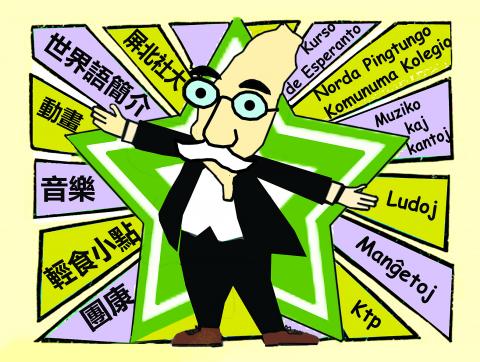French expat Cyril Vergnaud lives in Pingtung and speaks French, Chinese, Hoklo (more commonly known as Taiwanese) and English. He also speaks Esperanto.
Tomorrow, Vergnaud and students of Esperanto from Pingtung Community College will hold the Esperanto Festival (屏北社大世界語學員), an annual event that is open to the public. There will be a NT$100 door charge to cover drinks, snacks and a gift bag for everyone who attends, he said.
Esperanto is a language devised to enable communication among the world’s different language speakers. Vergnaud told the Taipei Times by e-mail that he became interested in learning the language purely by chance.

Photo courtesy of Pingtung Esperanto Festival
“I first met two Esperantists who live and work in Pingtung,” he said. “One guy, Reza Kheir-khah, is from Iran and a woman New Zealand, Simone Roberts, is also in our group here. While I had never studied Esperanto before, I soon learned from Reza and Simone that it’s easy to learn. So I decided to give it a shot. One thing led to another and we’ve got this annual festival.”
“What I discovered was more than just a language,” he said. “I became a member of a very interesting international community. I fell in love with the philosophy of Esperanto, as much as I did with the language,” he said.
Last year around 80 people attended the festival, Vergnaud said, many of whom were expats living in southern Taiwan and other countries such as Canada, Thailand, Spain and Japan, among other nations.
“In Taiwan, most Esperantists are Taiwanese,” he said. “But because we use this language a lot to travel, foreign travelers often visit us here in Pingtung.”

Jan. 5 to Jan. 11 Of the more than 3,000km of sugar railway that once criss-crossed central and southern Taiwan, just 16.1km remain in operation today. By the time Dafydd Fell began photographing the network in earnest in 1994, it was already well past its heyday. The system had been significantly cut back, leaving behind abandoned stations, rusting rolling stock and crumbling facilities. This reduction continued during the five years of his documentation, adding urgency to his task. As passenger services had already ceased by then, Fell had to wait for the sugarcane harvest season each year, which typically ran from

It’s a good thing that 2025 is over. Yes, I fully expect we will look back on the year with nostalgia, once we have experienced this year and 2027. Traditionally at New Years much discourse is devoted to discussing what happened the previous year. Let’s have a look at what didn’t happen. Many bad things did not happen. The People’s Republic of China (PRC) did not attack Taiwan. We didn’t have a massive, destructive earthquake or drought. We didn’t have a major human pandemic. No widespread unemployment or other destructive social events. Nothing serious was done about Taiwan’s swelling birth rate catastrophe.

Words of the Year are not just interesting, they are telling. They are language and attitude barometers that measure what a country sees as important. The trending vocabulary around AI last year reveals a stark divergence in what each society notices and responds to the technological shift. For the Anglosphere it’s fatigue. For China it’s ambition. For Taiwan, it’s pragmatic vigilance. In Taiwan’s annual “representative character” vote, “recall” (罷) took the top spot with over 15,000 votes, followed closely by “scam” (詐). While “recall” speaks to the island’s partisan deadlock — a year defined by legislative recall campaigns and a public exhausted

In the 2010s, the Communist Party of China (CCP) began cracking down on Christian churches. Media reports said at the time that various versions of Protestant Christianity were likely the fastest growing religions in the People’s Republic of China (PRC). The crackdown was part of a campaign that in turn was part of a larger movement to bring religion under party control. For the Protestant churches, “the government’s aim has been to force all churches into the state-controlled organization,” according to a 2023 article in Christianity Today. That piece was centered on Wang Yi (王怡), the fiery, charismatic pastor of the